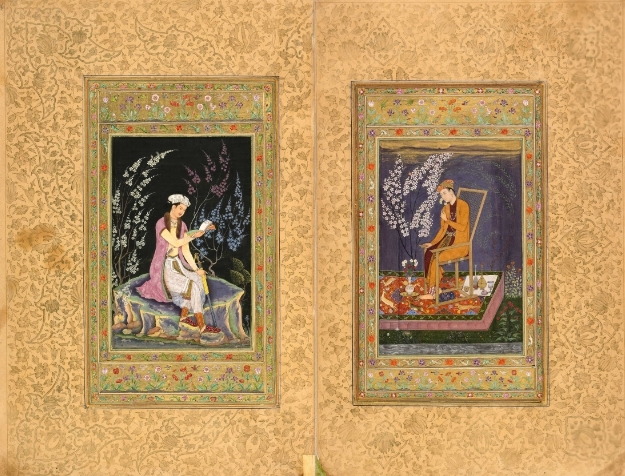Ghazal Dear, some days ago we had the pleasure to attend the 200 anniversary of the foundation of the “Max-Joseph-Stift“, the most prestigious girls college in Bavaria and the third highest ranked one in Germany. The daughter of good friends of us is learning at this elite gymnasium since 5 years now, and at the 200 years celebration we really got a nice impression of how well money can be spent to improve school education. The entire evening was choreographed by the girls themself, and it was really a nice show, a mixture of classical and pop and jazz music, theater, a sort of poetry-slam and video-performance of the 200 years history of the school and the building.
So I was absolutely convinced that a college that receives so much extra funding from the gouvernment to provide dedicated high-class training (historically to the daughters of the influential and powerful Bavarian families, but now to every girl who passes the competitive entrance exam) should have a long list of famous alumni, woman who went into politics, arts, science, became famous musicians or writers or journalists, filmmakers, critics, great painters and so on. Than I red an article from the local newspaper about the “Max-Joseph-Stift” and how proud the people from Munich-Bogenhausen can be to host such a renowned place of education on their territory. And as an example they listed some “famous” “Max-Alumni”: Putzi von Opel, Ottilie of Faber-Castel and Hannelore Elsner.
Hannelore Elsner I knew pretty well, because she is a good actress, but not really of world class or international rank. She played a couple of good character roles in sort of low-budget movies (like “Alles auf Zucker”), but did not reach the dramatic stand as Franka Potente or Marlene Dietrich or Hildegard Kneef. So Hannelore Elsner is a good actress, but not a great one. I would say there are maybe 200 actress in Germany in her league.
The first of the “famous” Max-alumni, Putzi von Opel however, I did not knew at all, and now it seems it is because I never was a regular reader of the yellow press. Since apart from beeing the grand-great daughter of Adam Opel, founder of the car-manufacturer, Putzi only became famous for her Paris Hilton life style in the Munich Schikeria, and for organising one of the biggest Canabis dealing networks in Munich. In 2006 she died in a car accident in Spain at the age of 55 years.
The third of the famous alumni from this college, Ottilie von Faber-Castel again did not gained fame for her own merrits, but for being born to a rich industrial dynasty, the pen-manufacturer Lothar Faber. What we can say positively on her is that during the time when she led the company, no major economic hussles occured and she continued to produce good-quality pencils, and the company is still doing this.
So from the 200 years of dedicated elite education for girls, the creme-de-la-creme of the alumni is an TV actress, a paparazzi celebrity and a woman who is famous for being born to a rich family. I am not questioning the potential of woman to reach the highest achievements in any area of human activity; I am absolutely positive they can easily compete with the creativity and commitment of us men. There are plenty of woman in Germany and anywhere in the world who by their genious, their talent and their courage can ashame all machos. Scientists such as Liselotte Meitner, Marie Curie or Rosalind Franklin, a mathematician as Sophie Kovalevskaja, Geneticists as Elizabeth Blackburn, Barbara McClintock or Christiane Nüsslein-Volhard found their places in the pantheon of human discoveries and knowledge. There were woman in politics such as Rosa Luxemburg, Olga Benario Prestes, Angela Davis or Tanja Bunke, who led heroic fights for a better world. There were fighters against fascism in Germany, like Sophie Scholl of the “White Rose Group” or Libertas Schulze-Boysen of the “Red Orchestra Group” or Ruth Werner. I have no space here to list all the great, gifted writers and poets among woman who stay equally high as their male peers. And in music and performing arts, the world would look only half as entertaining and productive without singers such as Maria Callas, Montserrat Caballe, Joan Baez, Kate Bush, Sherley Bassey, Miriam Makeba, Sade, Janis Joplin, Edith Piaf or actresses as Nicole Kidman, Greta Garbo, Marlene Dietrich, Sharon Stone and many others. But funny enough, neither of them went through a “girls-only-school”. I doubt that the idea to provide a protected environment for girls to achieve education without the harmful influence of boys is doing any good. For the parents it might seem that their daughters have less trouble to get good notes in such a single-gender school, and the students themself might also have the feeling that learning is easier if they are in separate girls classes. But on the long run, they are obviously not performing any better in real life. For the requirements of the real life, when you have to put the text books aside and forget about good marks, when you have to face the challenges of a modern world with its economic, political, social changes, when you have to find a place in the world and have to buildt your natural talents into productivity and raise your creative potential, than an education with the challenges and obstacles of mixed boys and girls classes provide a much better school for life. Of course every family is proud of its daughter, when she comes home with excellent marks, and at the end of term can even perform in front of the entire school playing some Schumanns piano piece or reading a nice essay. But as the English say: The proof of the pudding is by eating, i.e. school is a nice preparation, but sooner or later it should demonstrate its success by the achievements and the standing of its alumni later in life.



